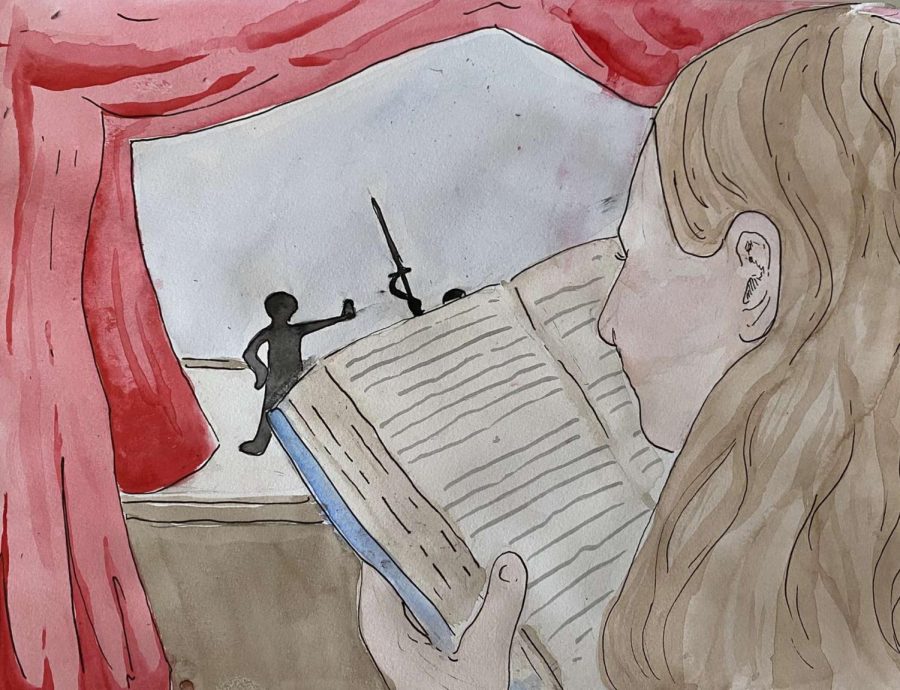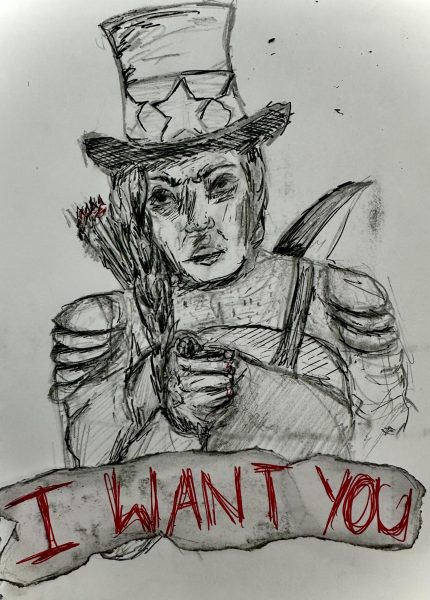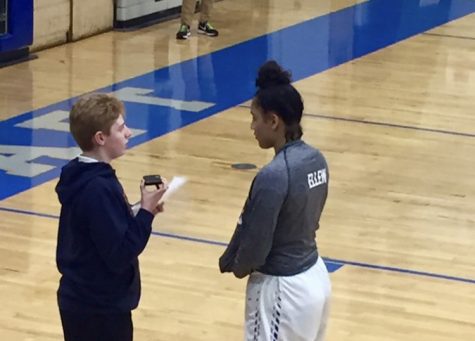A love letter to storytelling
A note from the author: A brief discussion of stories themselves
“Sometimes reality is too complex. Stories give it form,” – Jean Luc Godard, French-Swiss film director.
Once upon a time, I sat down at my computer and worried that maybe my topic was too broad. I realized that I had so much to say and no cohesive way to say it, but maybe that’s how every writer feels when they begin. But I figured it out, and that in itself is a story. Conflict, resolution. You turn the page, you keep going.
A story is change and connection. It could be beautiful, it could be tragic, it could be the most mind-numbingly boring experience you ever have — but it will still be a story. Why does that matter? Why am I writing this? It is partly because I have so much love for the subject it overflows, my heart can not contain the feeling, and I need to get it onto paper. And I think I’m not the only one.
So, I am writing this for all of the people who find solace in stories. To put our shared love into words. I am writing this to emphasize why they are important, and why they are meaningful. Why they need to be conveyed by storytelling. I do not just mean stories contained in novels, I mean any form of media in which change and connection happen. TV. Movies. Video games. Theater. Poetry. Anything. A story can exist in whatever format and remain just as wonderful, it can still be told in a way that is captivating. The audience will learn something, gain insight or empathy, a piece of the story will reside in them, they will feel seen, and the world will be a better place for it.
Act I: Change
It was a dark and stormy night, not again. Dawn broke on the horizon, finally. There is complete truth to the idea that all stories are simply slightly tweaked versions of the same thing. Something changed, and then it ended, though it was not really an ending, just a part of the story that seemed like an appropriate time to stop. But meaning lies in the nuance, what makes each version of the same basic outline hold a completely different message. Beyond that, meaning can be found in the medium.
Video games and acting are two methods of storytelling that directly appeal to the daydreamers and the doers. The people who want an escape, but also want to make it their own.
“When you’re interacting with , you’re making the decisions that cause things to happen, thus you are creating the story,” senior Charlotte Weissman said. The story can’t go on until you do something about it, say your line, press a button, that kind of thing.”
Essentially, you become the instigator of change. Yes, the choices can be limited in a game. Yes, you have set lines. But you are doing — you are becoming the story directly. The experience is then so much more immersive than any other form of storytelling for the performer and their audience. The same goes for a gamer. You step outside of yourself into a world that you brought to life. This can be wonderful for stress relief or just an opportunity for some much needed fun. Whether you’re killing zombies or being forced to do a re-enactment of Romeo and Juliet in English, you enter another story while taking a break from your own.
Storytelling is also a way for people to process change. Writing their thoughts and feelings out can help to process sudden turmoil because turning it into a story will organize your own inner world. The change within an author’s tale will either directly or indirectly mirror their experience, and with the eventual conclusion they too will hope to find some semblance of closure.
As American author Joan Didion once said, “We tell ourselves stories in order to live.”
Change is the most constant thing in life, and humans need to see change in stories. It makes the audience feel seen and supported when all else is bleak. The resolution of the tale is fuel to keep going, because it arms them with the hope that there is a better future awaiting them too. Stories make it feel like anything is possible, and that you can be the change you want to see.
Act II: Connection
What house would I be in?
It’s one of the first questions anyone who has watched or read the Harry Potter series asks themself. But, what they are actually asking is, “Who am I?” “Where do I belong?” And Rowling answers that question by sorting people based on their values, though coincidentally this system creates massive divisions amongst the students as a result of festering prejudice. Despite this, I think a large part of the appeal of the entire universe is that she gives people something to identify with.
“I feel for me personally, and I think a lot of people share this, is that what makes a story compelling is having relatable characters or themes,” Weissman said.
We cannot help but try to insert ourselves into a story, and when we do connect, it becomes all the more precious, meaningful and entertaining. The characters with whom we empathize will live on in our hearts, their journeys easing the pain of our struggles, their joy sparking our joy. It is a wonderful escape into a place where you can possibly find relief.
Further, storytelling facilitates interpersonal connection. If you do not identify with the themes or the characters, it gives you a chance to experience something completely new. In theater, where you have to learn the motivations, the values, the core, of your character, an actor is presented with an opportunity to become more deeply familiar with people different to them.
“[It’s] like ‘take a walk in their shoes,’ but literally you are playing them. I feel like it’s a really unique way of learning people’s life experiences,” Weissman said.
Even when someone does not actively tell someone else’s story, they can still become very immersed within the mind of the character by watching or reading, and thus be connected to their life.
“As long as they are taking us into the lives of others I think that’s the most important,” said Dane Haiken, the Creative Writing teacher at Lane.
As long as they provide insight, the story is meaningful. The type of insight will vary, but it will probably be more than you had before, and that is something. Especially if that insight facilitates empathy.
“I think a good story is one that puts empathy over agenda,” Haiken said.
A storyteller must have empathy for humans — they need to understand them — so that when they do share their story, people can connect and learn to understand.
Act III: Why everyone is a storyteller
There I was — unable to see my father through the tears that blurred my eyes while he stood before me, listening patiently as I explained the horrors I endured during my day at preschool. Choking on sobs, I tried in vain to communicate what had happened: a brief flash of daring, stealing the forbidden doll (it was a communal toy chest!), hair ripped, screaming and punching and kicking, terror. Never to be the same again. How dare she! A hug, more crying. Going home to a bowl of macaroni and cheese. Scooby-Doo, healing.
Every single day after that when I came home from school my father would ask me if anyone had kicked me and pulled my hair. If I said no, he would say that it had been a good day. For a decade this went on, and I never realized how much I enjoyed the tedious exchange until it stopped.
My tale of woe, as disjointed and chaotic as it was when I told it to my father, connected us over a shared memory that we consistently called to mind. Even though we do not do this bit anymore, the memory, the story, lives on.
Everyone does this. As soon as something exciting, weird, hilarious, shocking, scandalous, enraging, questionable, even dull, happens we want to tell others. It is something so innately human that people do not realize that each time they do this they are telling a story. The way they change their inflection for humor, or use their hands for emphasis, or even facial expressions, personalizes how they storytell. The same way a director might employ different cinematic techniques or an author will utilize various literary devices or sentence structures.
“We want to share those experiences with people and create common experiences,” said Haiken. “If someone in your family, or someone in your friend group, if they weren’t there for the thing you experience you still want to tell them about the experience so that they can have that with you, because that makes us bonded with each other. Even if we weren’t there, we can still be there with each other through stories.”
Everyone has a story. In fact, everyone is filled to the brim with stories. Each person has so many different experiences that others will never have in their entire lives, and by sharing them we can transcend the lack of understanding that plagues countless different people, groups, and countries.
Roger Ebert, an American film critic, once said, “Stories are an empathy machine.”
I do not know a person who could deny the truth of that statement. And isn’t that inspiring? If everyone can feel empathy when they hear a story, then everyone can learn to view the world through another’s perspective. That is of course idealistic — there are so many barriers to people being able to tell their story, but I want to encourage everyone to do whatever they can to share their stories, and to help others do the same. Through the decisions we make, we can write a new ending to this segment of history where a lack of empathy has become an insurmountable hurdle to necessary change. With opportunities for widespread communication more available than ever, we can actively create a world where people are connected by understanding.
“[Storytelling] is the original thing that created community,” said Haiken.
Post credits: A final farewell
Thank you to all of the people who have shared their stories with me. And thank you to my Dad who taught me to love them in the first place.
The end.
Your donations directly fund the Lane Tech student journalism program—covering essential costs like website hosting and technology not supported by our school or district. Your generosity empowers our student reporters to investigate, write, and publish impactful stories that matter to our school community.
This website is more than a publishing platform—it's an archive, a research tool, and a source of truth. Every dollar helps us preserve and grow this resource so future students can learn from and build on the work being done today.
Thank you for supporting the next generation of journalists at Lane Tech College Prep!

Saskia is a senior, this is her third year with the Champion. She loves writing and editing, and is planning to pursue a career in English. She spends...





